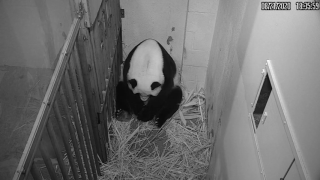
What to Know
- The zoo's female panda, Mei Xiang, gave birth to a cub at 6:35 p.m. Friday
- The zoo announced about 4 p.m. Friday Mei Xiang started showing signs that labor had probably started
- It's still too early to know whether the new cub is male or female
The National Zoo's giant pandas weren't empty nesters for long.
The zoo's female panda, Mei Xiang, gave birth to a cub at 6:35 p.m. Friday, less than a year after the pair's 4-year-old offspring, Bei Bei, departed for a new life in China, the zoo tweeted. The zoo said Mei Xiang is attentively caring for the cub, including nursing and cuddling her newborn.
The zoo tweeted video in which the cub can be heard squealing.
Another video show Mei Xiang licking her cub.
The zoo announced about 4 p.m. Friday that Mei Xiang had become increasingly restless and had begun body licking, both signs that labor had probably started.
It's still too early to know whether the new cub is male or female. The most reliable way to determine a cub's sex is through DNA analysis, the zoo has said. Scientists will get the cub's DNA from a cheek swab during an exam.
U.S. & World
The news of the birth comes just a week after the zoo announced they had detected a possible panda fetus on an ultrasound of Mei Xiang. On Monday, they shared that a fetal cub was seen "kicking" and "swimming" during another ultrasound performed that morning.
On social media, the zoo shared a short video clip of the panda fetus wiggling during an ultrasound and told followers, "Keep your paws crossed!"
Mei Xiang, now 22, has previously given birth to three surviving cubs: male Tai Shan July 9, 2005, female Bao Bao Aug. 23, 2013, and male Bei Bei Aug. 22, 2015. All three now live in China, per an agreement between China and the U.S. The youngest of the three, Bei Bei, departed for his new life just last fall.
All three cubs elicited major celebration when they were born. But there's been heartbreak along the way as well. In 2012, ending a seven-year gap after the birth of Tai Shan, Mei Xiang finally had a second cub, but it lived just a week. The following year, Bao Bao arrived, but with a stillborn twin. And Bei Bei was also born with a twin, but his brother lived only four days.
Photos: See Bei Bei Grow From Cub to Giant Panda
This March, Mei Xiang was once again artificially inseminated with semen from the zoo's resident male giant panda, Tian Tian. Although it's been months since then, pandas experience what's known as delayed implantation. When fertilization occurs, an embryo doesn't attach to the uterine wall until weeks or months later.
Panda pregnancies range from 90 to 180 days, with an average pregnancy of 135 days, the zoo said.
The panda house at the National Zoo is currently closed to provide a quiet environment for Mei Xiang. You can keep up with the pandas 24/7 on the zoo's panda cams.



